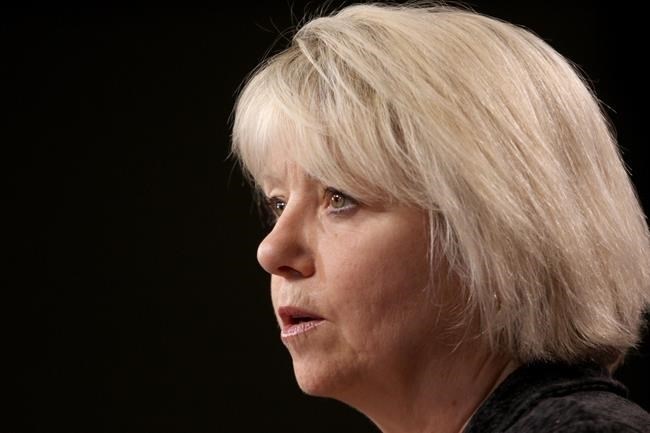
Provincial health officer Dr. Bonnie Henry speaks during a COVID-19 update at the legislature in Victoria, B.C., on Thursday, March 10, 2022.
Image Credit: THE CANADIAN PRESS/Chad Hipolito
September 14, 2022 - 9:00 PM
VANCOUVER - British Columbia's provincial health officer says the findings of a study she co-authored showing children and youth have had the highest rates of COVID-19 in parts of the province should not be interpreted to suggest those infections occurred mostly in schools.
Dr. Bonnie Henry has been criticized by some parents, advocacy groups and health-care professionals who say a major jump in infections occurred during the school year among children under age 10.
They say measures like masking for all students and ventilation upgrades in schools could have been taken earlier and should be continued to protect children from an airborne virus, especially as more transmissible variants emerge.
However, Henry said school-aged children were becoming infected when they were not eligible for a vaccine as transmission was rising in the community, but that most youth had a mild illness and were not hospitalized.
"We have shown, multiple, multiple times, that what happens in schools reflects what's happened in the community."
Measures were taken at schools to prevent prolonged closures in order to protect students' emotional well-being, and that goal was shared by the BC Teachers Federation, Henry said.
"Every single school had an assessment of their ventilation, every single school had measures put in place to ensure that it was improved. And that's one of the permanent things that we need to continue," Henry said.
The Education Ministry did not immediately respond to a request for information on the standard of ventilation upgrades that have been completed.
A spokesman for the BC Teachers Federation said no one was available to comment on any concerns the union may have, but a public reporting on ventilation upgrades was expected by either the ministry or school districts.
Henry said enhanced cleaning measures are in place, and other steps that everyone should continue taking include washing their hands and staying home when they're sick, especially as influenza season is expected to start earlier this fall.
"But then there are disruptive things like cohorting, the physical distancing, the mask mandates in certain settings. Those are overarching, broad tools that were meant to be temporary. And they were in place during the period of time when we had high transmission of the new virus, Omicron, until we could support the level of immunity primarily through vaccination," Henry said.
"We slowed it down as much as we possibly could, by using those very broad measures."
She said the findings of the preprint study, which has not been peer-reviewed and was published on the internet site medRxiv last week, are similar to those in other jurisdictions where schools were closed for much longer than in B.C.
The study lists Henry among 13 experts, including those from the BC Centre on Disease Control and the University of British Columbia. It says a series of surveillance reports of infections from the start of the pandemic until August this year show at least 70 to 80 per cent of youth in Greater Vancouver and the Fraser Valley have been infected with COVID-19.
In contrast, 60 to 70 per cent of adults aged 20 to 59 and about 40 per cent of those aged 60 and over have been infected, says the study, which is based on 14,000 anonymized blood samples obtained between March 2020 and this August from a network of outpatient laboratories.
Hybrid immunity from both high levels of infections and vaccinations is "good news" because it's protecting everyone, Henry said in response to those who have suggested the study shows a "let it rip" approach was used in schools to achieve that goal.
Henry urged all eligible B.C. residents to get a booster shot of a recently approved bivalent vaccine that offers protection against variants, including Omicron. The province is expected to send invitations for second booster shots this month.
Dr. David Buckeridge, scientific lead for data management and analysis at the federally funded COVID-19 Immunity Task Force, said findings in the study involving Henry are consistent with those around the world as Omicron took hold.
Data on younger age groups is limited in Canada, but information from Canadian Blood Services shows that in June, 71 per cent of donors between the ages of 17 and 19 had contracted COVID-19 across the country, and the number for the same age group rose to 72 per cent in July, he said.
However, the average sample size for those months involves about 530 people, said Buckeridge, who is also an epidemiologist and professor at the School of Population and Global Health at McGill University.
This report by The Canadian Press was first published Sept. 14, 2022.
News from © The Canadian Press, 2022